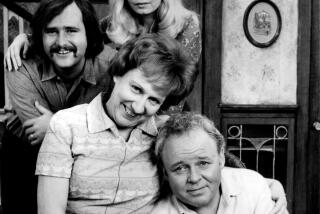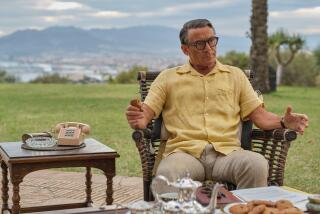Sweet Science Has Not Seen A Better One
The man across the table from me was a genuine American artifact, like the Liberty Bell, the Spirit of St. Louis, Franklin’s kite, Fulton’s Folly.
The face was old, yet young. The hair was patched with white but the cheeks were unmarked, unlined, as seamless as the ocean. The eyes were steady but glittered in their depth, a fighter’s eyes, seeing everything, revealing nothing.
Archie Lee Moore is a page from U.S. history. You look at him and you see an America that is no more, a harder place, yet softer. You look at him and you understand the spirituals. Mark Twain would have loved Archie Moore. Ernest Hemingway did .
Archie was the best mechanic who ever stepped into a ring. He made his fight like a guy building a bridge, or fixing a leak. He would amble across the ring at introduction and size up his opponent as if trying to see what the job called for, a wrench, a pair of pliers or a simple whack on the side of the set.
He fought with the deft, impersonal efficiency of a guy changing a tire. He had skills that hadn’t been seen in this country since the days of the booth fighters in the carnivals.
He was the world’s master at damage control. You could hurt Arch but you couldn’t put him away. His trick was to let you wear yourself out. He would wrap these huge, python-like arms about himself and peek through them like that reptile peering through the foliage, waiting for his prey to come into range.
He was more than a pug, he was a symbol. He fought guys half his age and not only beat them but also gave them a lesson. He was the idol of every guy in the country who suddenly began to notice the nights were darker and sounds lighter.
He was part of the conscience of America. Like Joe Louis, he made it easier for the guys who came later. He couldn’t get a title fight in his youth because white champions had better things to do than let Archie give them a lesson.
He roamed the world in search of a buck. He fought Australians in Sydney, Italians in Rome, Germans in Berlin and Argentinians in Buenos Aires. He would have fought a leopard in a tree, a bear in a cave, a shark in water if the price had been right.
He was one of a cadre of devastating black fighters who had to fight one another in those benighted times because no one else would. He beat them all. He outlasted them all.
He fought till he was an old man--if that phrase can be ever applied to Archie Moore. He was almost 50 years old when he finally got his shots at the title. He had to take Doc Kearns, the manager of champion Joey Maxim, to get his light-heavyweight championship.
He had to write to every newspaperman in America to get his well deserved heavyweight title shot, 35 letters a night, hand-written, for months.
He missed a lot of meals when he was growing up, but Archie never “did business.” There are no mysterious “KOd by” notations on Archie Moore’s record. Even if all he had to eat all day was a doughnut, you got a war from Archie when the bell rang.
The record book says he’s 72, and that’s about as good a guess as any. Put it this way: It’s in the right century. Archie always traveled light, and there wasn’t always room for a birth certificate in the luggage.
He used to drop 30 to 40 pounds to get down to his weight limit, but Archie was the whole book on ring science. The light-heavy division is the low rent district of boxing, but Archie ennobled it when he was there. He was the best there was, ever, in that class.
He was one of the five or six best there ever were at any weight. He got $275,000, the most he ever made, from fighting Rocky Marciano. Rocky didn’t knock him out, he wore him out. But it was Marciano who retired after that fight, not Archie.
He had 240-some fights between 1935 and 1964. When you talk of great fights of the century, you begin with Dempsey-Firpo, but then, in the next breath you have to come up with Moore-Durelle.
Yvon Durelle was a strong-backed, willing young Canadian fisherman who hit with the force of a freight train and had a style to match. He caught Archie at the opening bell and decked him three times in the first round and several times thereafter.
“I was unconscious for five rounds, and when Doc Kearns told me not to get discouraged, I was winning the fight, I said, ‘What fight?’ ” Archie recalled. As soon as Archie knew where he was, he knocked out Durelle.
There’s no one else around like him today. The other Archie Moores are as long gone as the buffalo, the Pony Express, the other things that made America great.
They’re giving a testimonial for Archie in his hometown of San Diego at the Inter-Continental hotel next Friday.
It’s not a benefit. Archie doesn’t need a benefit. Archie’s doing just fine, a squire of San Diego and working for HUD, the government agency. Proceeds will go to young boxers, but the testimonial is being held because it’s 50 years since Archie first climbed into a ring.
Durelle will be there, and so will Muhammad Ali, Ken Norton, both Sugar Rays--Robinson and Leonard--and Floyd Patterson and Jimmy Bivins. They are guys Archie fought, guys Archie lit a candle in the window for.
It will be a salute to a man who made and lived history. Life never laid a glove on Archie, either, and why should it? Archie always could handle those clumsy opponents who led with their rights. Sooner or later, Archie figured them all out and it was all over.
More to Read
Go beyond the scoreboard
Get the latest on L.A.'s teams in the daily Sports Report newsletter.
You may occasionally receive promotional content from the Los Angeles Times.










